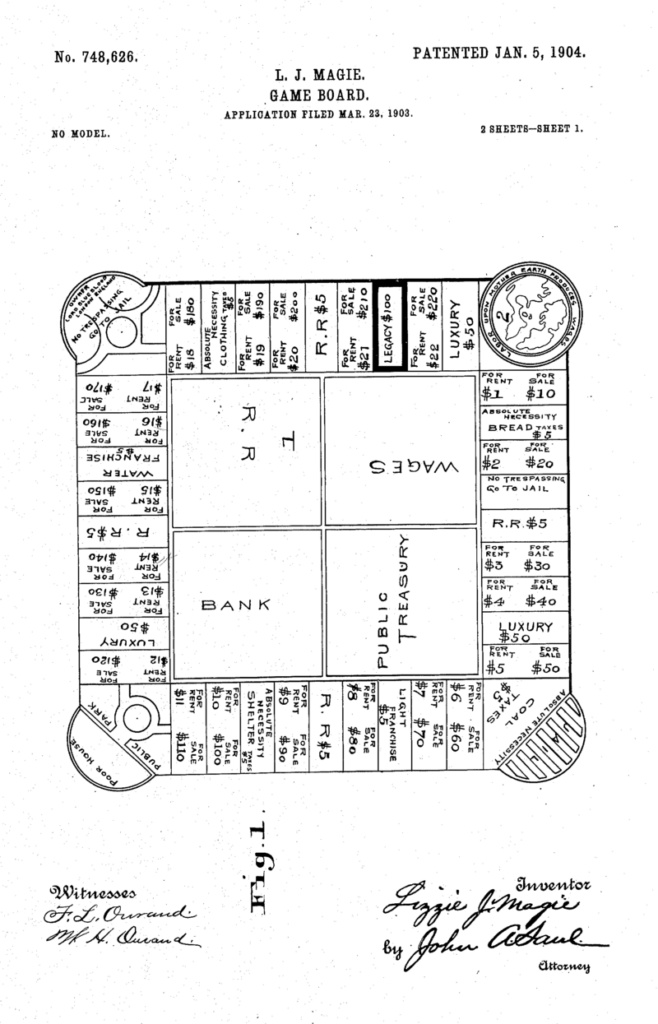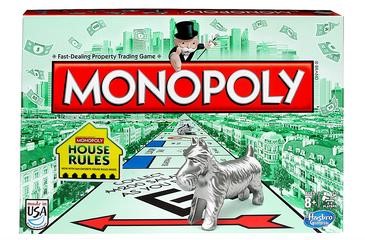Woodbrooke’s Communications Officer Aled Vernon-Rees explores the unlikely anti-monopolist and Quaker history of Monopoly and asks if we can still see these roots in todays game.
I have always felt that there is a kinship between Quakers and board games. One of my earliest memories of attending Quaker children’s group was being huddle round a table playing a chocolate-based game about Fairtrade (though I can’t remember the name!) and in many cases board games can be in keeping with our Quaker values; they can bring us together, they can educate us, they can be part of our spiritual life and they can even be campaigning tools for justice.
However, a board game which seems far from the ideals of the Quaker testimonies is the game of Monopoly. Yet this game, focused around driving those around you into bankruptcy, surprisingly has its roots in both anti-monopolist values and Quakerism. So, let’s explore the unlikely history of Monopoly and see if it retains any of these values today…
Elizabeth Magie and The Landlord’s Game

On the East Coast of America during the early 1900s, Elizabeth Magie created The Landlord’s Game. As a Georgist, Magie adhered to an economic ideology asserting that land should be collectively owned. The game was created to be a practical demonstration of these principles, illustrating how the acquisition of land and rental markets bolstered landlords’ wealth at the expense of tenants. To this end, Magie devised two rule sets for the game: one advocating against monopolies, rewarding all participants as wealth was generated; and another promoting monopolies, where players built monopolies and crushed their opponents. Through playing both versions of the game, participants should come to see the unfairness of monopolies. However, this is not exactly how it turned out…
The game was eventually published in 1906; however, the competitive element of the game took hold of the players, and a homemade shortened version of the game, which removed the anti-monopolist rules and added an auction, became popular in the 1910s. This version of the game was passed through word of mouth, and individuals created their own versions of the board, despite Magie’s attempts to regain control over the handmade versions of the game.
The Atlantic City Quakers & Charles Darrow
In the 1930s, Ruth Hoskins, a Quaker teaching at Earlham College in Indianapolis, introduced this handmade version of the game to a group of Quakers in Atlantic City – though it has been said that this was done in secret as Quakers were against rolling dice. The group went on to make a number of changes to the game, many of which shaped the game that we see today. Firstly, they created a new board which reflected the street names and railroads of Atlantic City. One of the members of the group, Jesse Railford, set the property values which remain in use today. They decided to reinstate the original rule of buying properties at their listed price, removing the auction feature as Quakers were opposed to this at the time, and they also chose to use household items as the pawns (sound familiar?).
One of the Atlantic City Quakers, Eugene Railford, took a copy of the game to Philadelphia and taught it to Charles Todd, who in turn taught it to Esther and Charles Darrow. Charles Darrow, clearly inspired by crushing his opponents in the game, then went on to distribute it himself as Monopoly, claiming that he invented it, apparently never speaking to Charles Todd again. For a long time, Darrow was credited as creating the rules of the game; however, over the past 40 years, more people have come to uncover Elizabeth Magie (and the Atlantic Quakers’) involvement in its genesis. There’s even a book documenting the complicated story of its beginning if you want to explore the topic even further; The Monopolists. The Monopolists. Obsession, Fury, and the Scandal Behind the World’s Favorite Board Game (2015) by Mary Pilon.
Monopoly Today

Today, Monopoly remains the best-selling board game of all time. It could be argued that the game is far removed from Magie’s original intention and the values of the Quakers that shaped it; families sit around tables rejoicing in the demise of their sibling’s wealth and lie in waiting hoping for their loved ones to end up in jail. To a degree, this may be true; however, though Monopoly has become a staple game in most households, I find it difficult to find a single person who actually enjoys playing the game, and it’s not an unpopular opinion to completely despise the slightest suggestion of playing it (it even gets a dismal 4.4 rating on BoardGameGeek).
I think the reason for this is because it is, in fact, a truly unfair board game. Players end up creating wealth almost completely based on luck, and from early on in the game, if you’re not one of those lucky people, you are offered very little opportunity to turn things around. You then have to endure a very painful 2 to 3 hours of waiting for it to end. Is this not in line with what Magie wanted us to feel? To associate the word ‘monopoly’ with unfairness? To dislike it when wealth is created mostly through chance? I think through it’s flaws as a board game Monopoly has come around full circle to be the anti-monopolist game it was always intended to be.
This blog is part of an ongoing series on Quakers and games. Also see:
Bringing social justice to life – Games and Quakerism by Jessica Metheringham




